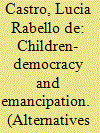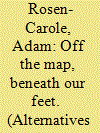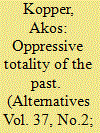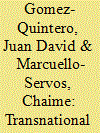| Srl | Item |
| 1 |
ID:
113786


|
|
|
|
|
| Publication |
2012.
|
| Summary/Abstract |
Modern conceptions of politics are intrinsically related to theories of subjectivity shaped by a teleological narrative expressing claims about instrumental rationality, moral and psychological autonomy, and individualized selfhood. Consequently, children have been considered to be lacking both the credentials necessary to act and participate in politics and the subjective dispositions of proper political subjects. This overwhelming conception of subjectivity as a purposefully and rationally oriented individual produced by a sovereign politics may be contested. Empirical data deriving from recent research on children's and youth's participation in schools are presented to show how children and youth effectively manage "to speak" and build a different point of view from those of adults about their school experience. Such research provokes analysis of insidious but unpublicized forms of domination and resistance. The inclusion of children in politics seems to depend on our capacity to overcome taken-for-granted truths about adult-centered society.
|
|
|
|
|
|
|
|
|
|
|
|
|
|
|
|
| 2 |
ID:
113784


|
|
|
|
|
| Publication |
2012.
|
| Summary/Abstract |
The imaginary consolidation of America as a sovereign nation-state situated on a state-centric international topography was and remains predicated on spatializing practices bound up with the ongoing eradication of indigenous people(s) and simultaneous effacement, or at least repression, of the violence of the (neo)colonial encounter. The American nation-state is founded on the all-but-forgotten bodies and worlds of indigenous peoples and is continually secured by a narrative constellation that reduces the decimation of people(s) to a clearing of space on which a sovereign nation could be constructed or within which it could evolve. This article will trace the various techniques of decimating indigenous cultures and bodies that facilitate efforts of nationalist historiography that reduce indigenous cartographies to mere space situated within a narrative trajectory of American national unification.
|
|
|
|
|
|
|
|
|
|
|
|
|
|
|
|
| 3 |
ID:
113783


|
|
|
|
|
| Publication |
2012.
|
| Summary/Abstract |
Controlling for insecurities depends on a capacity to make inferences on the basis of experiences about the past, yet the use of knowledge about the past for anticipating and predicting future threats is highly problematic. This article examines the problem of governing individuals on the basis of what is available about their past deeds and social networks in governmental and commercial archives. It highlights the tension between administrative and private narratives about individuals, the former being constructed on the basis of minute details collected and stored about individuals since birth, and the latter referring to the accounts individuals offer of themselves. By applying the notions of ipse and idem identity developed by Paul Ricoeur, the article examines the two-way flow between memory and identity and the consequent concern that administrative narratives are blind to the ethical renewal of individuals, to the capacity of Man to extricate himself from the shackles of his past. To prepare the ground, the article considers some inherent limitations of biopolitics, pointing out that although biopolitics was classically concerned to govern both individual bodies and the body politic, administrative and governmental limitations have led states to govern the "average citizen" rather than individuals in their "individuality."
|
|
|
|
|
|
|
|
|
|
|
|
|
|
|
|
| 4 |
ID:
113781


|
|
|
|
|
| Publication |
2012.
|
| Summary/Abstract |
Contemporary research on the international relations of Southeast Asia has neglected the latent possibilities of reading non-western indigenous forms of international relations as a contribution to worldwide debates on the nature of international politics. Drawing on one precolonial account of Southeast Asian political practices in the Malay Archipelago, the Sejarah Melayu, this article proposes that Southeast Asians have previously philosophized about "intersocietal relations" in ways that privilege noble prowess, knowledge quests, and hierarchical justice through the interdependence of trade and culture within the region, and with India, China, and the Arab world. These features can still speak to contemporary relations between peoples rather than states and to security issues within borderless regions.
|
|
|
|
|
|
|
|
|
|
|
|
|
|
|
|
| 5 |
ID:
113782


|
|
|
|
|
| Publication |
2012.
|
| Summary/Abstract |
Scholars have recently paid increasing attention to China's "mega events" as a form of image management striving to influence future world order. In this article, the author examines China's recent world fair, Expo 2010 Shanghai China, and argues that we need to move beyond the reading of mega events as simple representation and ideology and read it also as simulation and simulacra. Reading the Chinese world fair as a simulacrum of world order can provide different ways of relating "the West" to its "other country" China. The author examines this relation through asking what it means to be the fair: Where is the world fair? When is the world fair? Who is the world fair? Reading the world/fair as simulacrum disrupts the fair's notions of inside and outside, now and then, subject and object to the point where these terms are no longer workable.
|
|
|
|
|
|
|
|
|
|
|
|
|
|
|
|
| 6 |
ID:
113785


|
|
|
|
|
| Publication |
2012.
|
| Summary/Abstract |
This article analyses a particular case of interactions between "Southern" and "Northern" nongovernmental organizations (NGOs). It considers a sample of Colombian social movements and organizations concerned with victims of Colombian armed conflicts as well as some Spanish NGOs working in Colombia. Specifically, it considers relationships, communication processes, and organizational patterns, and identifies an emergent practice of "transnational political echolocation" understood in terms of mobilizing and grievance strategies within a transnational arena shaped by information and communication technologies.
|
|
|
|
|
|
|
|
|
|
|
|
|
|
|
|